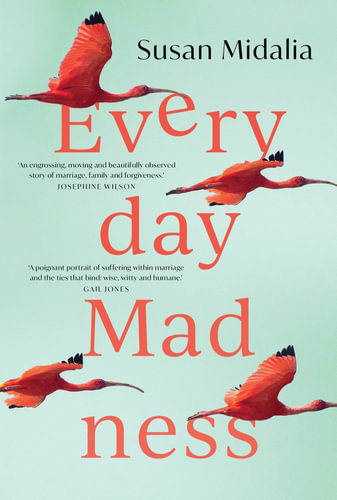On the cusp of releasing her new novel, Everyday Madness Susan Midalia shares how loss compelled her to become a writer.
Midalia shares how loss compelled her to become a writer.
I’ve been an enthusiastic reader for decades, but one particular event in my adult life impelled me to become a writer. A few days after my father died, I found myself scribbling words onto a page without understanding why. The writing initially resembled a series of diary entries – spontaneous, private jottings – about my difficult relationship with my father. But soon I began to see patterns, a shape, a sense of purpose in those muddled beginnings. The story became, in short, a therapeutic exercise: a way of trying to understand what it might mean to be a daughter who didn’t love her father, who indeed had no respect for him. Then, by a series of coincidences and without any planning on my part, my story ended up being published in a literary journal. What happened next was both unexpected and immensely gratifying: I had responses from readers telling me that my story had encouraged them to reflect on their own fathers, on the process of dying, on the nature of grief, or the inability to feel grief. I realised that my story had moved from self-expression to communication: that my words had made some kind of difference to people I didn’t even know. I realised, too, that I wanted to keep doing this wonderful thing: turning black marks on a screen into something for people to believe in. So, in 2006, and with the blessing and crucial financial support of my husband, I quit my teaching job and embarked on a full-time writing life.
Since then, I’ve published three short story collections: A History of the Beanbag, An Unknown Sky and Feet to the Stars, all shortlisted for major Australian literary awards. I have also published two well-received novels: The Art of Persuasion (2018) and Everyday Madness (2021). I’m keenly aware that my writing life is a highly privileged one; most writers I know need a day job to pay the bills, but I have the luxury of spending unlimited, unpressured time doing what I love. It also helps that our children have left the parental nest, both of them leading happy and productive lives. One of those children told me I had to stop writing about sex (definitely an exaggeration). My husband told me I had to stop killing off husbands in my fiction (I tell him it’s simply a device to move the plot along).
What do I love most about writing? I love the challenge of creating characters who are not like me. I love encountering the unexpected: characters who refuse to do what I want; a plot that changes tack; a new character who didn’t feature in my original intentions; reaching a conclusion that surprised me. I also love the process of self-editing. Rethinking, changing words or the structure, making sure that every word in a sentence is necessary, or tossing 20,000 words in the bin and starting all over again. It’s both a lot of hard work and a lot of fun, and I wouldn’t write if it wasn’t fun.
My subjects are typically ‘domestic’ – marriage, family, relationships in general, and the daily world of work. While ‘domestic’ writing, especially by women, is often dismissed as a trivial or predictable depiction of ‘ordinary’ life, I believe that no-one and nothing is ordinary. A good writer can make putting out the rubbish an interesting, even an extraordinary, experience; it’s only a matter of finding the right words.
 My new novel, Everyday Madness, is darker than my previous fiction, but I’ve injected some humour into the narrative. I think humour not only alleviates the gloom; it can also encourage us to think about human motivation and actions, about social problems and the necessity for hope. As the great comic writer Oscar Wilde observed: ‘Humour is the most serious form of literature.’ Even something as crude as a fart joke can make people think. As small children, my sons loved playing with a toy called a whoopee cushion, which made a loud, farting noise whenever someone sat on it. They did it so many times, and every time they would collapse with laughter (as did their parents, I have to confess). Now why do some people find that joke hilarious? I’ll leave you to think about that!
My new novel, Everyday Madness, is darker than my previous fiction, but I’ve injected some humour into the narrative. I think humour not only alleviates the gloom; it can also encourage us to think about human motivation and actions, about social problems and the necessity for hope. As the great comic writer Oscar Wilde observed: ‘Humour is the most serious form of literature.’ Even something as crude as a fart joke can make people think. As small children, my sons loved playing with a toy called a whoopee cushion, which made a loud, farting noise whenever someone sat on it. They did it so many times, and every time they would collapse with laughter (as did their parents, I have to confess). Now why do some people find that joke hilarious? I’ll leave you to think about that!
Thank you f or visiting, Susan.
Everyday Madness is in all good bookstores and online.
You can find Susan on Twitter or at her website
